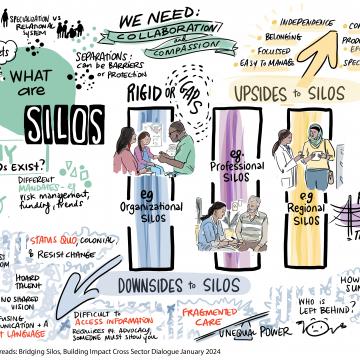
Bridging silos and building impact in BC’s health system
More than 130 people from diverse perspectives across British Columbia...
Emotion is a powerful tool. It can have a positive effect on cognitive processes—such as learning, memory, and problem-solving—and can play an important role in the education of future healthcare providers.
This past fall, patient perspectives enhanced student learning through the involvement of community members as co-facilitators in the capstone workshop of UBC Health’s Integrated Curriculum. The Integrated Curriculum is a series of online workshops and modules where health professional students learn with, from, and about each other while developing collaborative skills.
The 2021 Integrated Curriculum wrapped up in November, with the successful delivery of an updated Collaborative Decision-Making (CDM) workshop that incorporated both practitioner and patient/family perspectives through a co-facilitator model. This was the first time patient co-facilitators were part of the delivery of the Integrated Curriculum.
It’s one thing to speak about collaborations from a textbook or lecture, but it’s a whole other ballgame to bring patients into the mix.
Nearly 700 students benefited from the rich insights shared by patient facilitators about how collaborative approaches have impacted their healthcare. Bringing patients into the workshop not only provided valuable real patient exposure during the pre-clinical years of students’ programs but did so in an interprofessional context.
Karen Firus was one of the inaugural CDM patient facilitators. Karen has myalgic encephalomyelitis (formerly known as chronic fatigue syndrome) and has struggled with the debilitating condition for more than 40 years. Fueled by her strong desire to educate and motivate health students to become exceptional healthcare providers, Karen joined the UBC Interprofessional Health Mentors Program and subsequently applied to become a patient facilitator for the Collaborative Decision-Making workshop.
“It’s one thing to speak about collaborations from a textbook or lecture, but it’s a whole other ballgame to bring patients into the mix,” says Karen. “That’s where students get the real deal. There’s nothing better than hearing about actual experiences told in a riveting manner.”
Deanna Bracewell, Curriculum Manager at UBC Health, agrees. “The new CDM workshop allows students to hear patients’ lived experiences—both the pragmatic aspects and emotional responses—of health diagnoses, care, and navigating the health system,” says Deanna. “It’s these patient stories that students are likely to remember, which can influence their approach to patient care once in practice.”
Collaborative decision-making with patients will be one of the most rewarding experiences a healthcare professional will ever have.
In her workshop session, Karen spoke about mutual respect, consideration, and how to develop effective collaborations with patients—but her main goal was to inspire.
“I’m all about getting students excited about their potential in the world and how to thrive with interprofessional collaborations,” says Karen. “Collaborative decision-making with patients will be one of the most rewarding experiences a healthcare professional will ever have. Students need to know the transcending impact they can have on a patient’s health and life.”
“We are grateful to all the patient facilitators for their insightful, inspiring presentations and willingness to share their journeys to enhance student learning,” says Deanna. “They have paved the way for ongoing patient involvement in the Integrated Curriculum.”
And because of their efforts, the Collaborative Decision-Making workshop will continue to include patient facilitators in 2022 and beyond.
UBC Health would like to thank the inaugural CDM patient facilitator team of Alexis Chicoine, Karen Firus, Cheryl (CJ) Johnson, Jory Mitchell, Bruce Raber, Melanie Reid, and Mandy Young.
Posted January 14, 2022